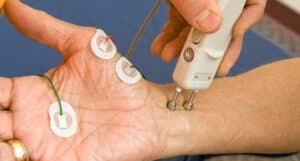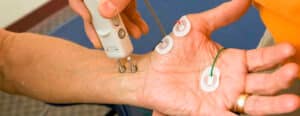4 min read
Understanding NCV Nerve Conduction Study: A Comprehensive Guide
If you’re experiencing symptoms like numbness, tingling, or weakness in your limbs, your doctor may recommend a NCV nerve conduction study. This diagnostic test measures the speed and strength of electrical signals in your nerves, helping your doctor diagnose conditions like carpal tunnel syndrome, peripheral neuropathy, and more. Learn everything you need to know about this test in our comprehensive guide.
1. What is NCV Nerve Conduction Study?
3. What is NCV Nerve Conduction Study?
4. How to prepare for the test and what to expect during and after the procedure.

Foto: Precision Health
1. What is NCV Nerve Conduction Study?
NCV Nerve Conduction Study is a diagnostic test that measures the speed and strength of electrical signals in your nerves. During the test, small electrodes are
placed on your skin and a mild electrical current is applied to stimulate the nerves. The response of the nerves is then recorded and analyzed by a s
pecialist to determine if there are any abnormalities or damage to the nerves. This test is commonly used to diagnose conditions like carpal tunnel syndrome, peripheral neuropathy, and other nerve-related disorders.
2. How is the test performed?
During an NCV Nerve Conduction Study, small electrodes are placed on the skin over the nerve being teste
d. A mild electrical current is then applied to stimulate the nerve, which may cause a tingling or twitching sensation. The response of the nerve is recorded and analyzed by
a specialist to determine the speed and strength of the electrical signals. The test is typically performed in an outpatient setting and takes about 30-60 minutes to complete. It is a safe and non-invasive procedure with minimal discomfort.
3. What is the purpose of NCV Nerve Conduction
Study?
NCV Nerve Conduction Study can diagnose a variety of conditions related to n
erve damage
or dysfunction, including carpal tunnel syndrome, peripheral neuropathy, radiculopathy, and
sciatica. It can also be used to evaluate
the severity of nerve injuries or monitor the
progression of certain conditions. Your doctor may recommend an NCV Nerve Conduction
Study if you are experiencing symptoms such as numbness, tingling, weakness, or pain in
your arms, legs, hands, or feet.
4. How to prepare for the test and what to expect during and after the procedure.
Before the NCV Nerve Conduction Study, you should inform your doctor of any medications
you are taking, as some may interfere with the test results. You may also be asked to avoid caffeine and nicotine for a few hours before the test. During the procedure, small electrodes will be placed on your skin and a small electrical current will be applied to your nerves. You may feel a mild tingling or discomfort, but the test is generally not painful. A
fter the test, you can resume your normal activities immediately. Your doctor will discuss the results with y
ou and determine any necessary next steps.

Foto: Health Jade
